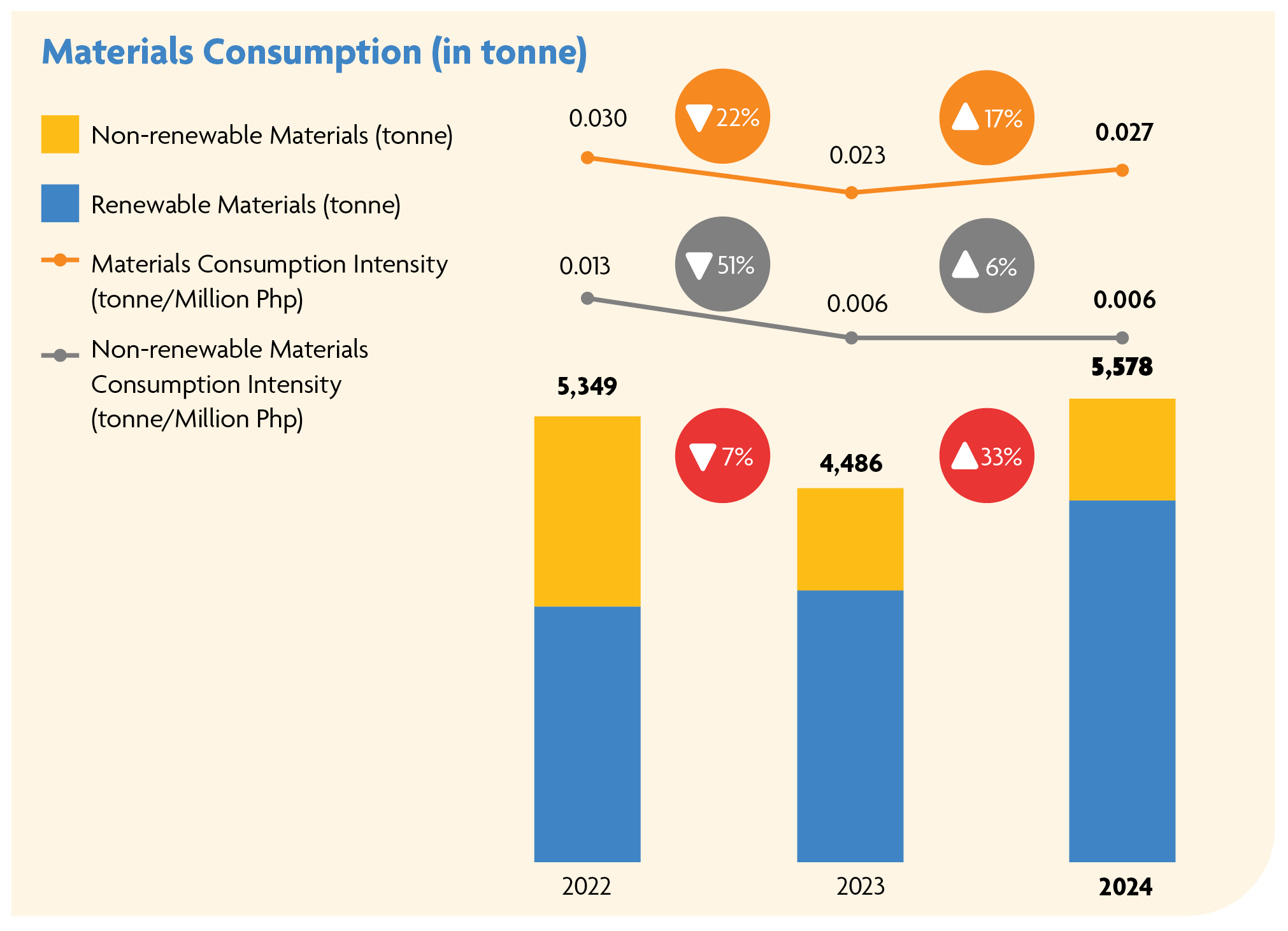


Robinsons Retail achieved a 3.7% increase in net sales, reaching ₱199.2 billion, driven by the resilience of its staple businesses—food and drugstores—which collectively accounted for 78% of total revenues. Blended same-store sales growth (SSSG) remained relatively flat during the first three quarters but accelerated to 3.4% in the fourth quarter, supported by easing inflation and strong holiday season sales, bringing the full-year SSSG to 1.5%.
Both gross profit and EBIT grew at a faster pace than revenues.
Gross profit expanded by 5.5% to ₱48.1 billion, driven by an
improved assortment and continued vendor support. EBIT rose by
8.9% to ₱9.7 billion, as cost optimization efforts offset
expansion-related costs. Net income attributable to the Parent
more-than-doubled to ₱10.3 billion, primarily due to the
one-time gain from the merger of Robinsons Bank into the Bank of
the Philippine Islands (BPI), lower losses from associates
following the reclassification of GoTyme from an investment in
an associate in 2023 to an equity instrument financial asset in
2024, and a reversal of foreign exchange losses into gains.
Meanwhile, core net earnings—which exclude foreign exchange
gains/losses, interest income from bonds, equity in earnings
from associates, interest expense related to the BPI shares
acquisition financing, BPI cash dividends, and other one-time or
non-operating items—grew by 12.8% to ₱6.4 billion.
Robinsons Retail continued to expand its store network, adding
60 new stores primarily under the food and drugstore banners,
bringing the total store count to 2,453. This includes 761 food
segment stores, 1,133 drugstores, 50 department stores, 227 DIY
stores, and 282 specialty stores, comprising 110 appliances and
electronics stores, 42 toy stores, 106 mass merchandise stores,
12 beauty stores, 10 pet retail stores, and 2 lifestyle sneaker
stores. Additionally, the company has a network of 2,115
franchised stores of TGP.
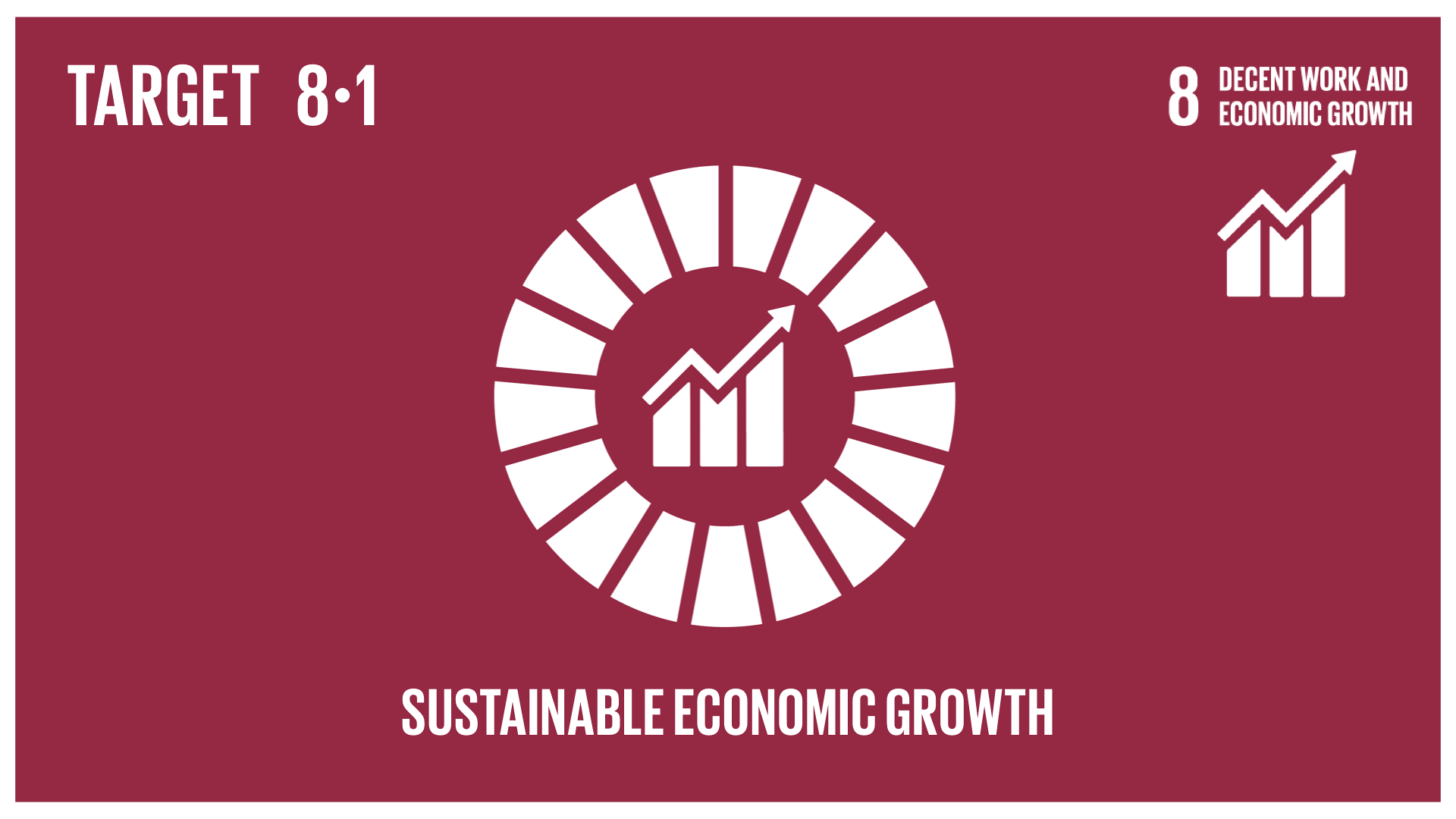 Economic Performance
Economic Performance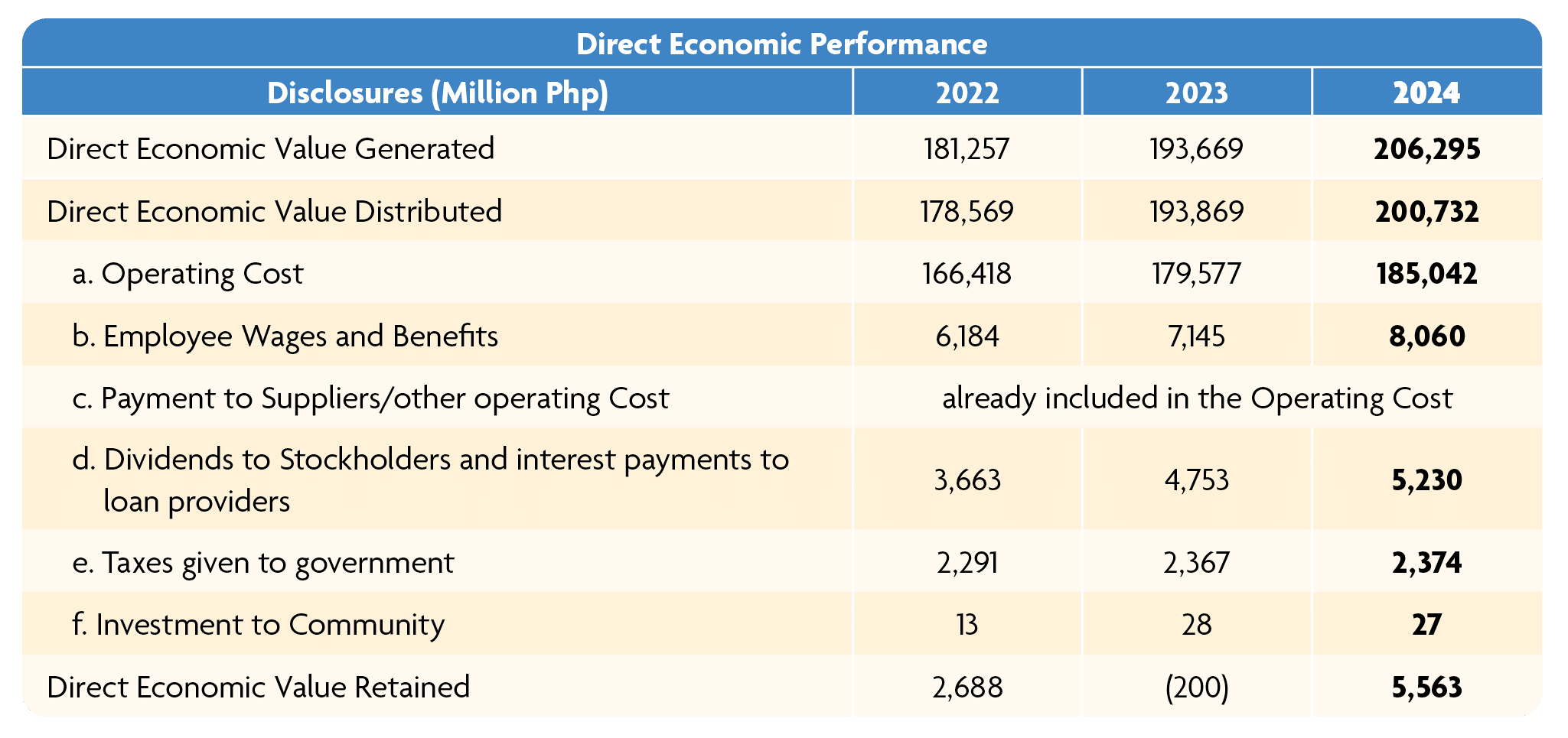
 Diversity Powers Our Progress
Diversity Powers Our ProgressDiversity drives us forward. By embracing different
perspectives, backgrounds, and experiences, we at Robinsons
Retail build stronger teams that are empowered to deliver the
best results for our customers and communities. Our commitment
to fostering an inclusive workplace remains steadfast. Our
hiring and onboarding processes are designed to be objective
and non-gendered, ensuring equal opportunities for all. This
approach enables us to attract and retain a diverse pool of
talent, empowering individuals to thrive in an environment
where they feel valued and respected.
Women continue to play a crucial role in Robinsons Retail's
leadership. As of 2024, 70.5% of our workforce are women,
underscoring their strong presence across all levels of our
organization. Women hold 57.8% of executive-level positions,
marking an increase from 54.5% in 2023 and reflecting our
continued efforts to promote gender equity at the top.
Similarly, female leaders comprise 64.8% of our managerial and
supervisory roles. Meanwhile, women represent 73.9% of our
rank-and-file employees, maintaining a consistent majority
across our workforce.
In line with our commitment to inclusivity, we are proud to
provide meaningful employment opportunities to Persons with
Disabilities (PWDs). As of 2024, 21 PWD employees are part of
our Southstar Drug team, reinforcing our goal of building a
workplace that reflects the diversity of the communities we
serve with the aim of expanding the program across other
banners.
Our efforts in championing our employees resulted in our
inclusion in the Philippine Daily Inquirer and Statista’s list
of the Philippines’ Best Employers 2024, where we ranked 4th
out of 21 companies in the retail and wholesale industry. Our
subsidiaries Robinsons Supermarket, Robinsons Appliances, Rose
Pharmacy, and South Star Drug were also recognized.
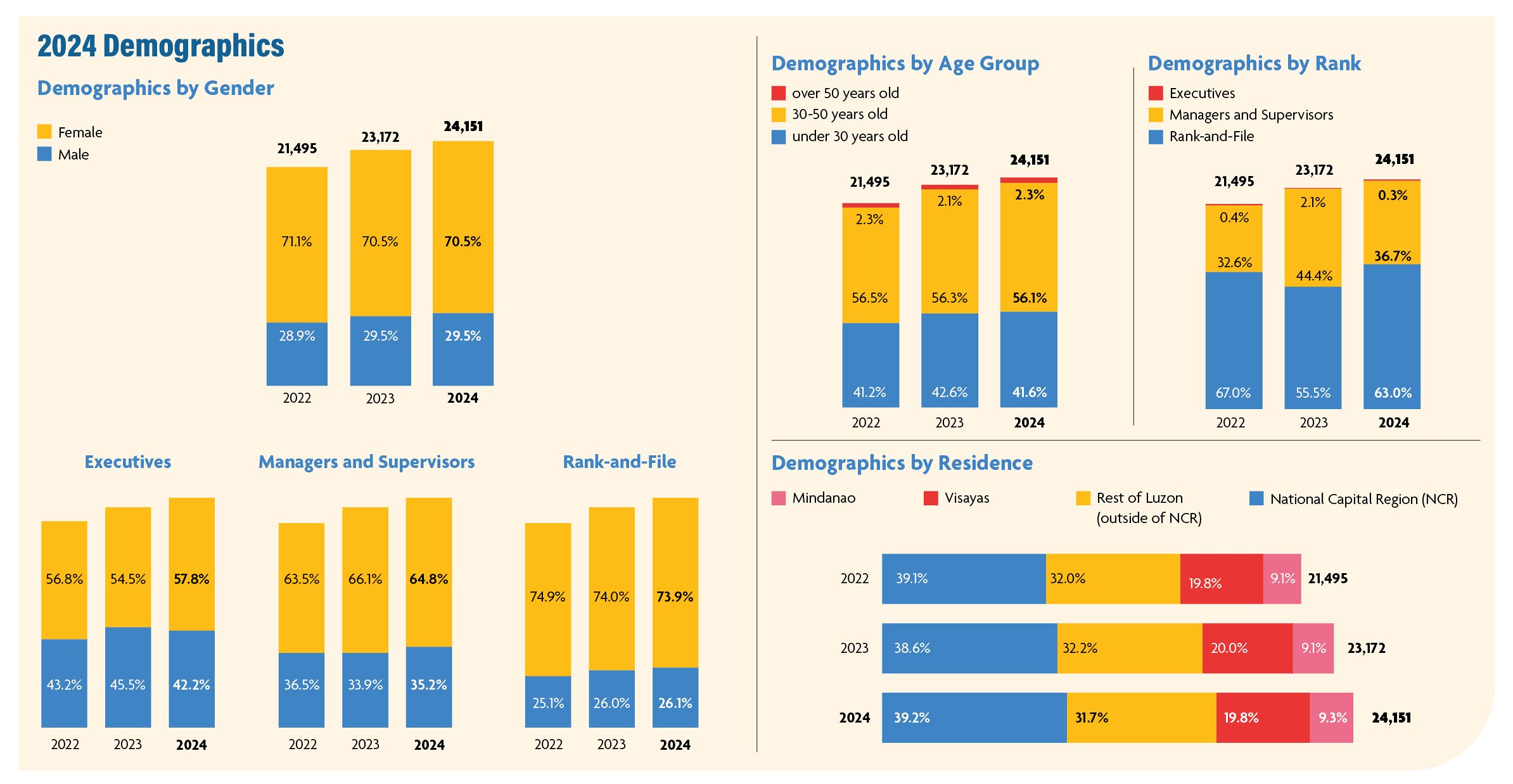
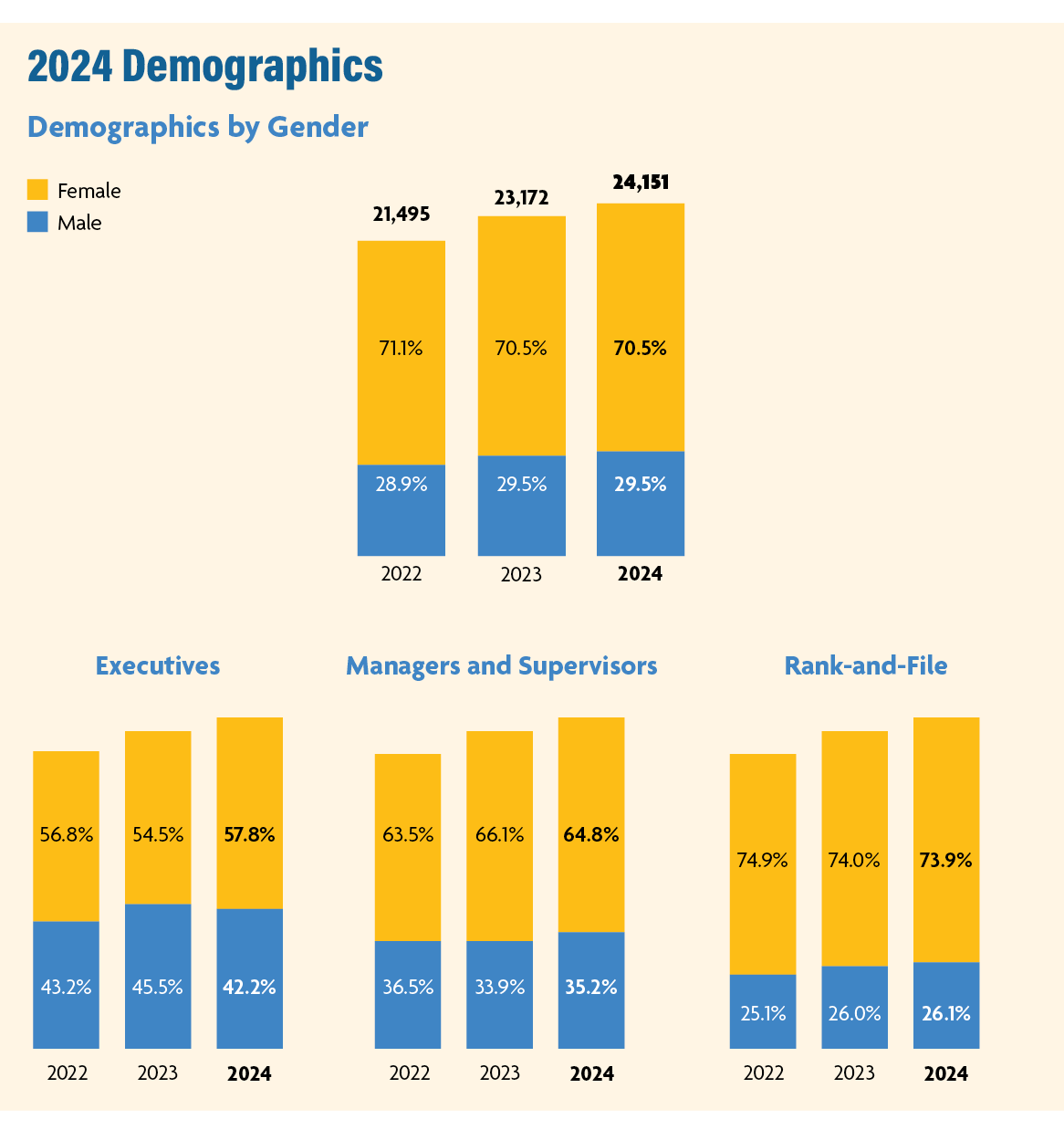
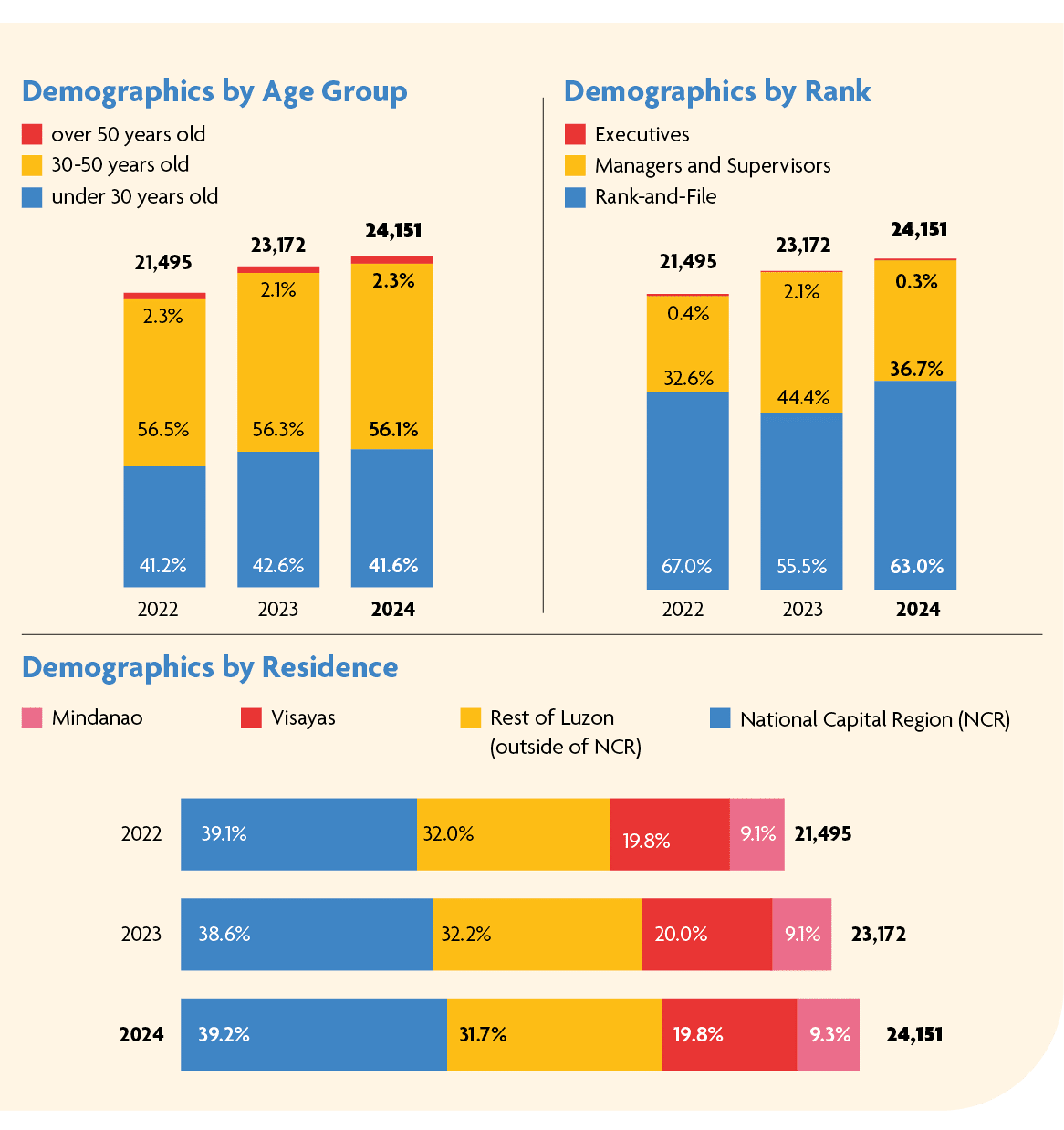
 Pride in Inclusivity
Pride in InclusivityDiversity and inclusivity are fundamental to Robinsons
Retail’s culture. We are committed to fostering a safe and
inclusive work environment that embraces individuals of all
backgrounds and diverse SOGIESC (Sexual Orientation, Gender
Identity, Gender Expression, and Sex Characteristics).
As part of our first-ever Pride Month celebration, over
1,000 head office employees gathered last June to reaffirm
our commitment to an inclusive workplace where individuality
is valued, and self-expression is encouraged. As an
organization, we believe that what makes each of us unique
makes us collectively stronger and better.
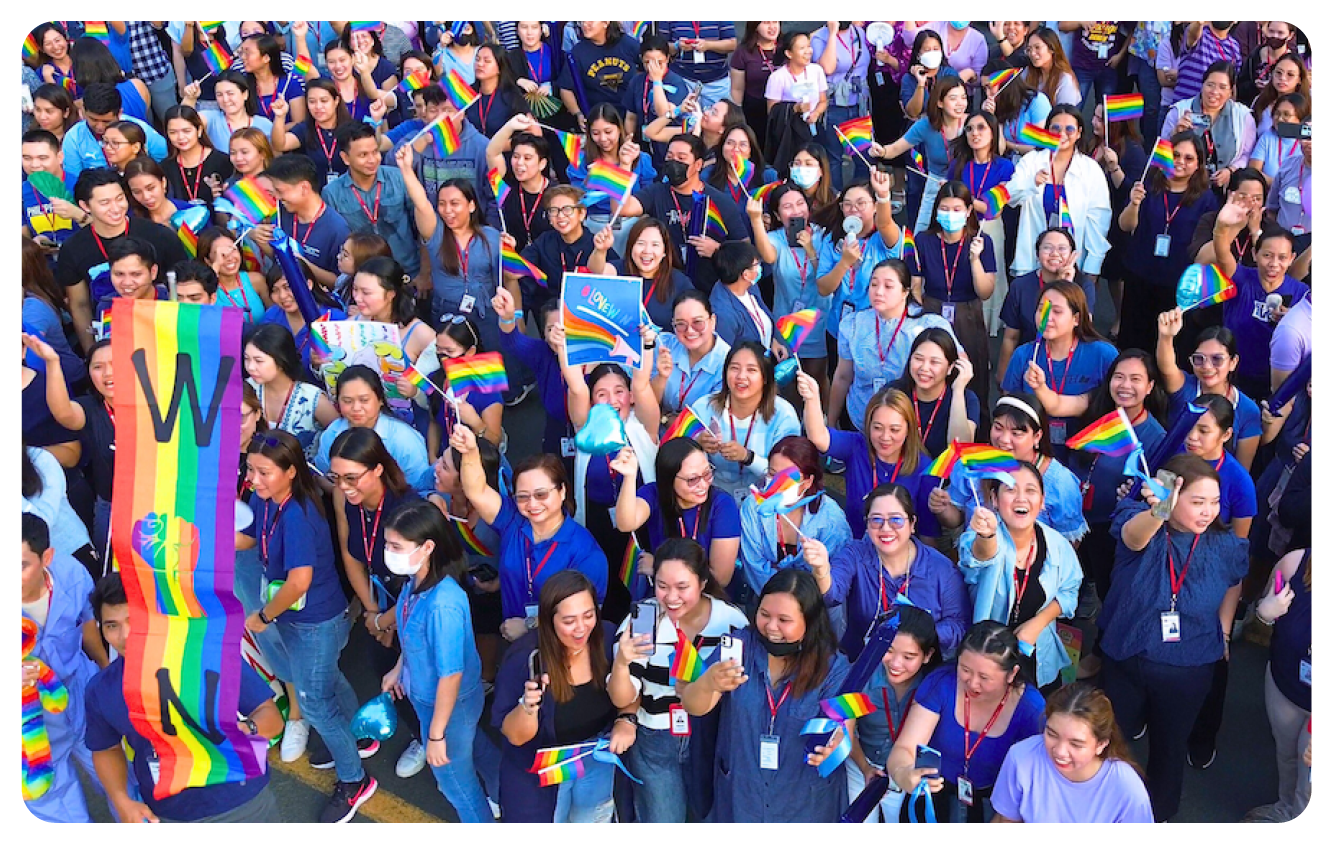

Moving forward, we remain dedicated to strengthening our Diversity and Inclusion policies and initiatives, ensuring that inclusivity is not just a value but a lived experience across our organization every day.
 Championing Inclusive Employment
Championing Inclusive EmploymentSouthstar Drug was named as a finalist in the diversity and inclusion category of the Investors in People Philippines Awards 2024, a recognition that underscores our commitment to fostering an inclusive and empowering workplace as we continue to collaborate with the Project Inclusion Network, the Autism Society of the Philippines, the Down Syndrome Association of the Philippines, the Philippine Business and Disability Network, the Parañaque Center for Children with Special Needs, and the Manila City Hall. Since 2016, we have provided employment opportunities to close to 40 PWDs across our stores, with a 90% retention rate.
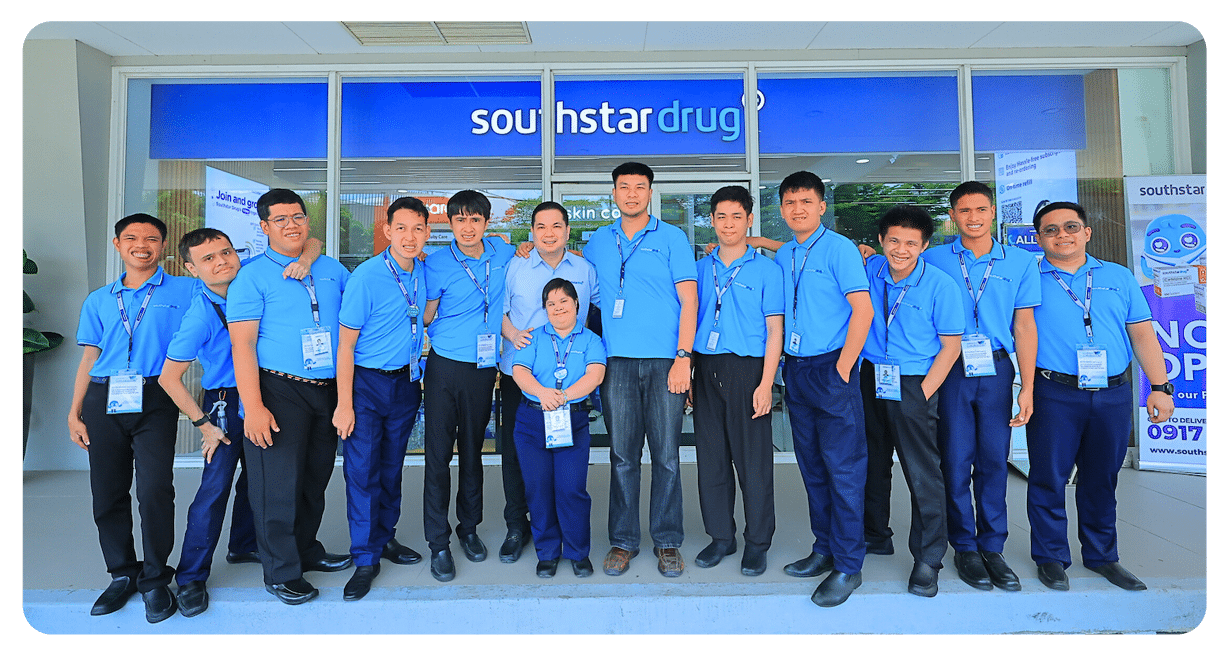

As a company rooted in care and service, we strive to scale
our efforts in inclusive employment within the retail
pharmacy sector in the Philippines.
With this commitment, Southstar Drug aims to allocate at
least 1% of all positions to PWDs, aligning with the mandate
of RA 10524: An Act Expanding the Positions Reserved for
Persons with Disability. To amplify our impact, we are
actively preparing to expand this program across other
banners, embedding inclusivity as a core pillar of our
sustained growth and social responsibility.
 Women Empowerment
Women EmpowermentIn August 2024, Robinsons Retail, represented by Group
General Manager Joanne Seno-Arceo, participated in the launch
of the “Census on Women in Executive Leadership Teams in
Publicly Listed Companies” organized by the Philippine
Business Coalition for Women Empowerment (PBCWE). This event
aimed to shed light on the representation of women in
executive leadership roles across various industries.
She highlighted the company’s ongoing efforts in championing
gender diversity and inclusion across Robinsons Retail,
reinforcing its dedication to fostering a more equitable
workplace.
At the event, Joanne was joined by Thea Marie Sordan from
Cebu Pacific Air, another company under the Gokongwei Group.
The presence of both leaders underscored the group’s
commitment to gender diversity across its various businesses.
The event also provided an opportunity to connect with other
women leaders and discuss further advancing gender parity in
leadership.
 Safeguarding our Employees
Safeguarding our EmployeesEnsuring the health and safety of our employees is paramount
to Robinsons Retail, as it directly impacts their well-being
and productivity. We adhere to stringent standards set by the
Department of Labor and Employment to maintain safe and
healthy working conditions across our operations.
In 2024, Robinsons Retail recorded 57,801,976 safe manhours
following 58,021,056 in 2023. Work-related injuries
significantly decreased to six in 2024 from 17 in 2023,
reflecting our ongoing efforts to improve workplace safety.
To ensure preparedness, we conduct regular safety drills at
our head office and across retail banners, equipping employees
with the knowledge to respond effectively in emergencies. Our
teams also undergo continuous training to promote hazard
identification and ensure regulatory compliance.

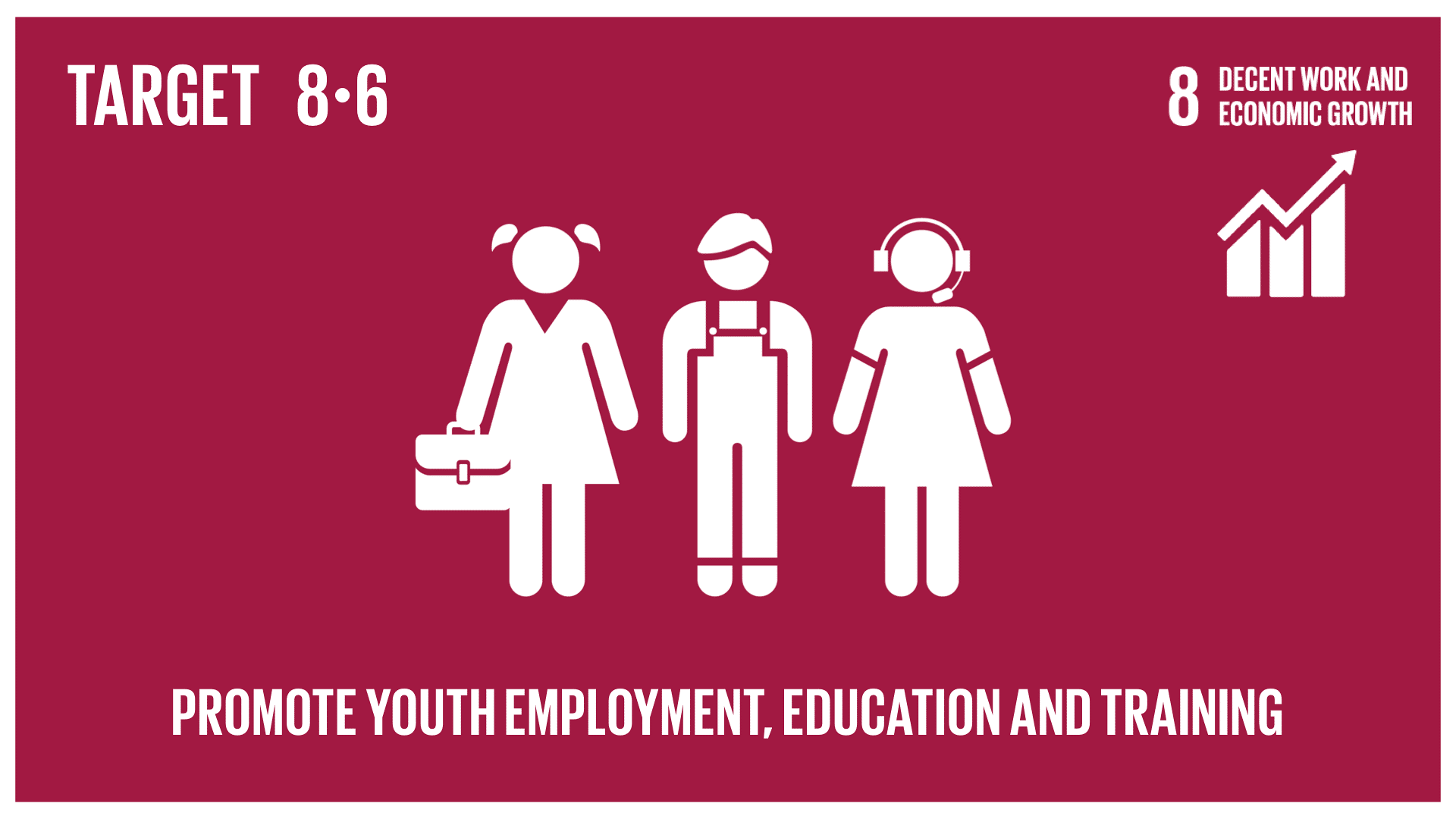 Investing in Growth through Learning
Investing in Growth through LearningOur commitment to helping our employees grow by providing
meaningful learning opportunities remains. Through the
Robinsons Retail Academy (RRA), we offer structured programs
that equip our people with the skills and knowledge they need
to succeed in their roles and advance in their careers.
RRA delivers targeted programs that address the diverse
learning needs of our workforce. New hires undergo a
structured orientation to ensure smooth integration, while our
Digital Learning Program offers bi-weekly courses focused on
personal, people, and operational excellence. For regular
employees, the Retail Excellence Curriculum builds
retail-specific leadership and management skills, while the
Management Development Curriculum—now called the General
Management Development Program—prepares key talents for future
leadership roles. Thematic Programs also address strategic
priorities like supply chain management and customer
experience.
In 2024, we expanded our leadership development initiatives
with the Leadership Enhancement & Acceleration Program
(LEAP), which has two tracks: leadership and a specialized
track for functional competency mastery. Additionally, the
Executive Development Program (EDP) was introduced in
partnership with esteemed institutions such as IMD, INSEAD,
Deloitte, and CCL, ensuring high-caliber executive education
tailored to business needs.
A key highlight of 2024 was the Leadership Management
Development Program (LMDP), where 25 Robinsons Retail
executives completed a six-module curriculum at the Ateneo
Graduate School of Business – Center for Continuing Education
(CCE). Spanning three months, the program covered MBA-level
subjects and culminated in an Action Learning Project, where
participants applied their acquired knowledge to real-life
business challenges. The final presentations were evaluated by
a distinguished panel of executives from Gokongwei Group and
Ateneo, reinforcing the practical impact of the program.
To increase accessibility and flexibility, we expanded our
digital learning initiatives in 2024, driving higher
engagement across all levels. Total training hours for the
year reached 194,014, with employees averaging 8.0 training
hours each.
Through these efforts, Robinsons Retail continues to invest
in its people, ensuring they are equipped to thrive, innovate,
and contribute to the company’s long-term growth.
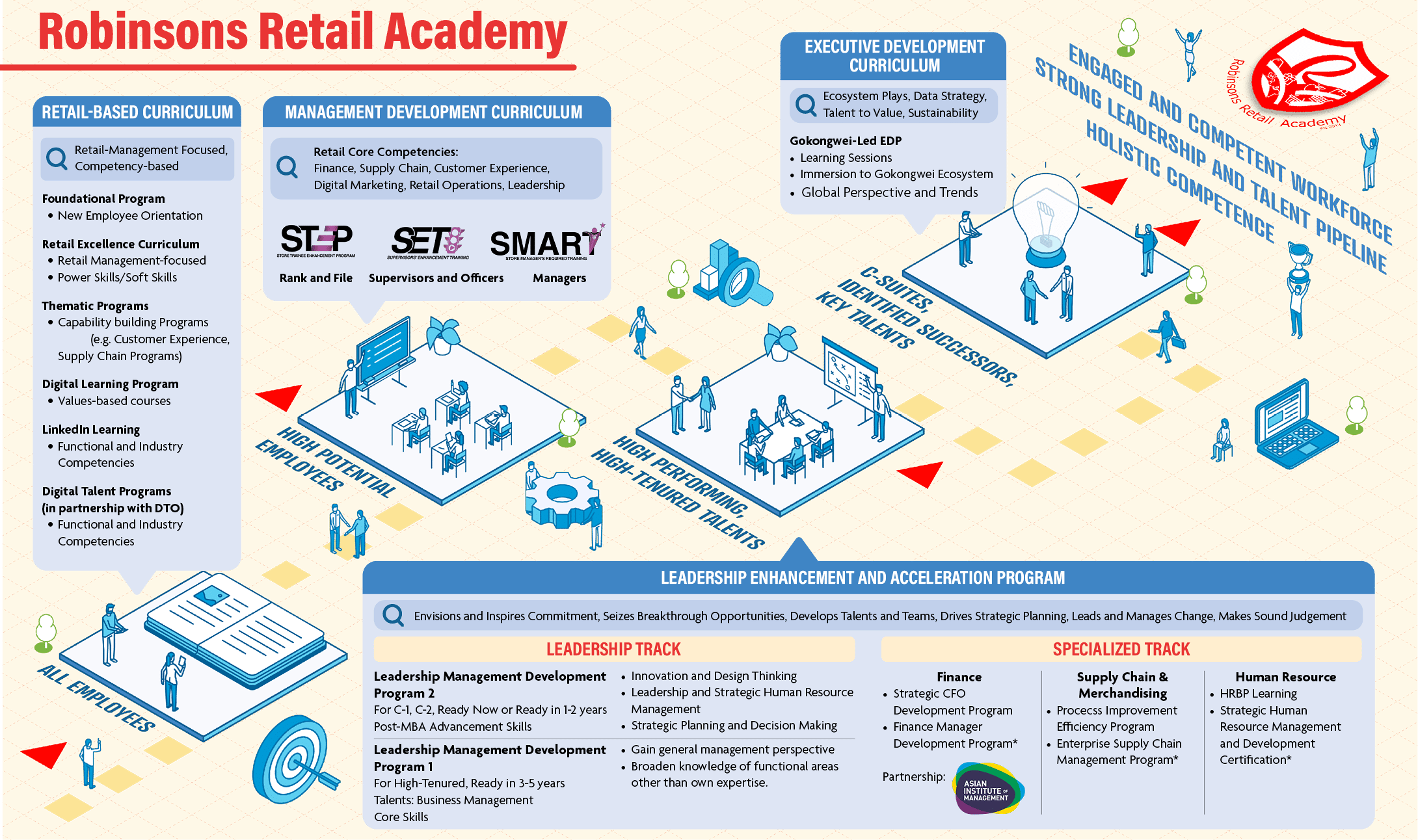 Robinsons Retail Academy
Robinsons Retail Academy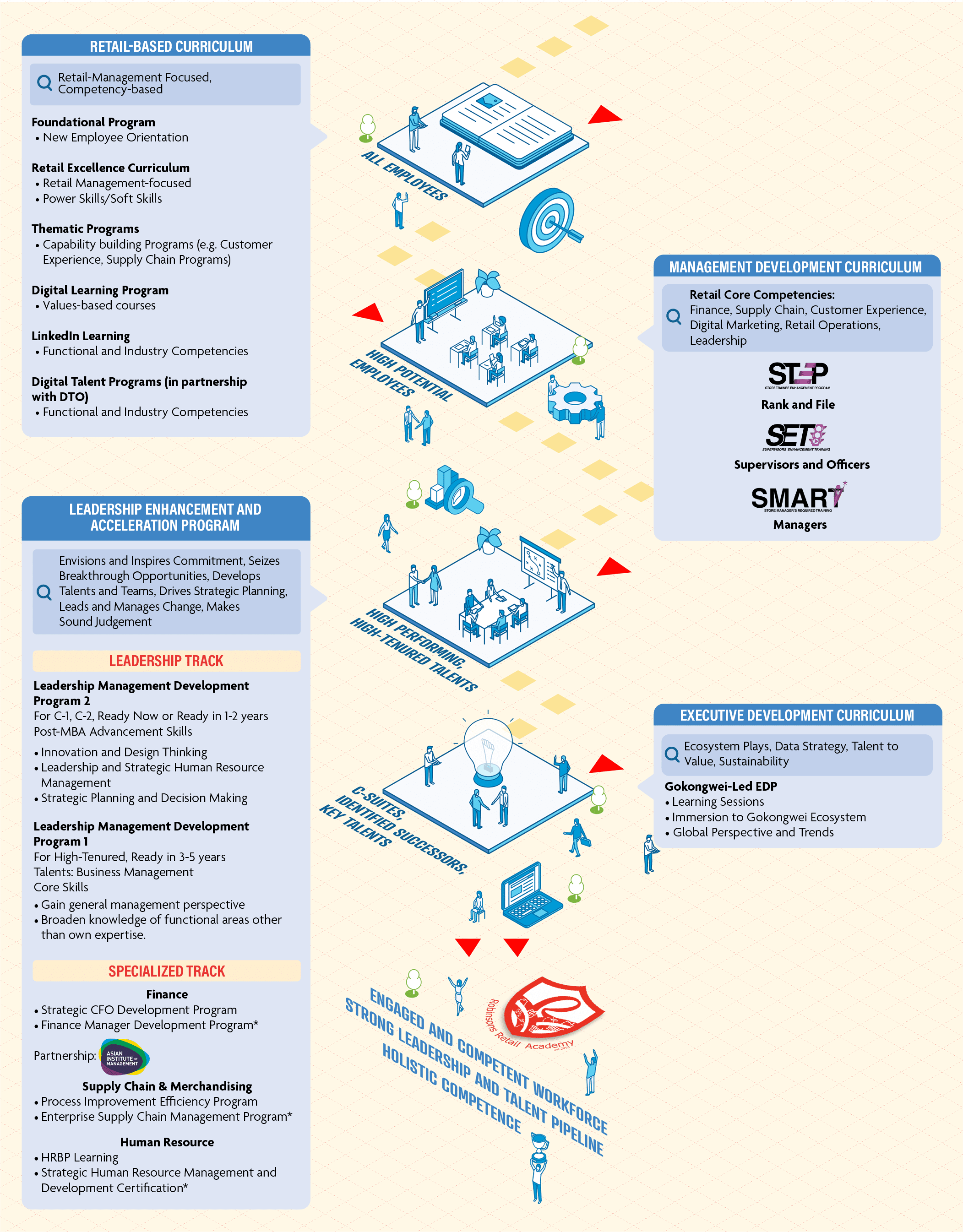
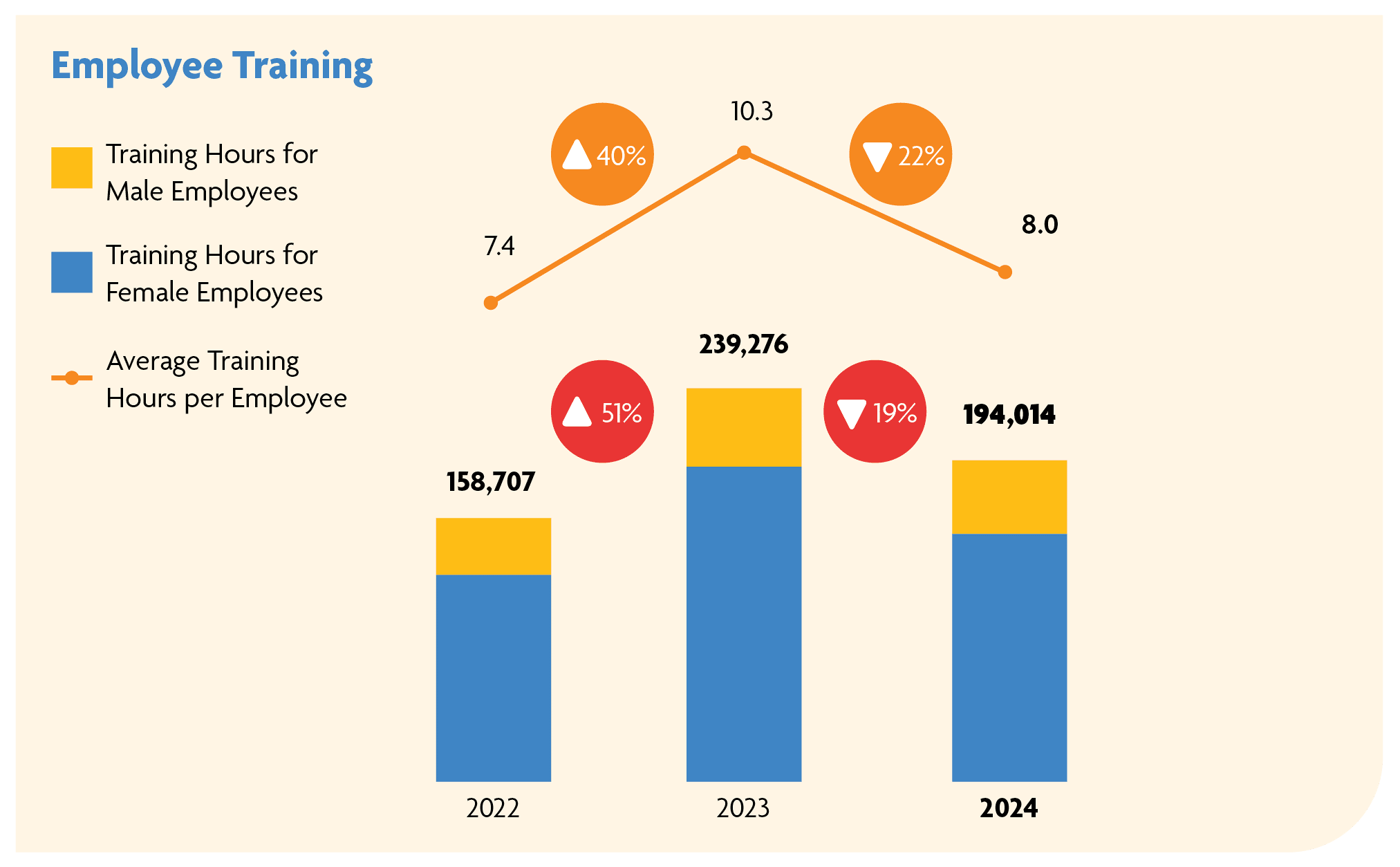
 Energy Management and Climate Action
Energy Management and Climate ActionGiven our reliance on electricity and fuel for store and
office operations, we recognize the need to manage our energy
use and emissions more effectively. In recent years, we have
begun transitioning to lower-impact refrigerants in our
refrigeration and air-conditioning systems and have started
exploring energy-efficient technologies. We are also in the
early stages of conducting more thorough energy and emissions
studies and assessing the potential for renewable energy
sourcing—particularly for facilities with higher energy
consumption—as our store network continues to grow.
In 2024, Robinsons Retail consumed a total of 401.9 million
kilowatt-hours (kWh) of energy. Of this, 99.4% came from
non-renewable sources such as grid electricity, generator
sets, and our company fleet. Steadily, our renewable energy is
growing at 0.6%. Solar installations at our head office,
combined with the existing renewable power generations of 2
Shopwise stores brought renewable consumption to 2.4 million
kWh—an increase of 28% from 2023. This transition avoided
approximately 1,666 tonnes of CO2 emissions, equivalent to the
annual carbon absorption of over 76,000 mature trees.
Our total greenhouse gas emissions stood at 407,279 tonnes of
CO2 emissions—68% from electricity use (Scope 2) and 32% from
direct fuel use and refrigerant leakage (Scope 1). Despite a
3% rise in grid electricity usage due to store expansions, we
achieved a net reduction of 10,915 tonnes of CO2 emissions
compared to 2023. This was mainly due to the gradual shift
away from high-global-warming refrigerants in our food
segment. The resulting emissions reduction is comparable to
the carbon captured by 501,163 mature trees.
We are currently undertaking a group-wide energy and
emissions study to guide the development of realistic yet
progressive climate targets. These efforts are aimed at
improving operational efficiency while supporting a
longer-term shift to cleaner energy options.
On climate resilience, we are looking to conduct new hazard
and vulnerability assessments for recently established
critical facilities, planning to expand these in the years
ahead as part of strengthening our overall climate strategy.
For prior assessments, please refer to pages 25–31 of our 2023
Annual and Sustainability Report.

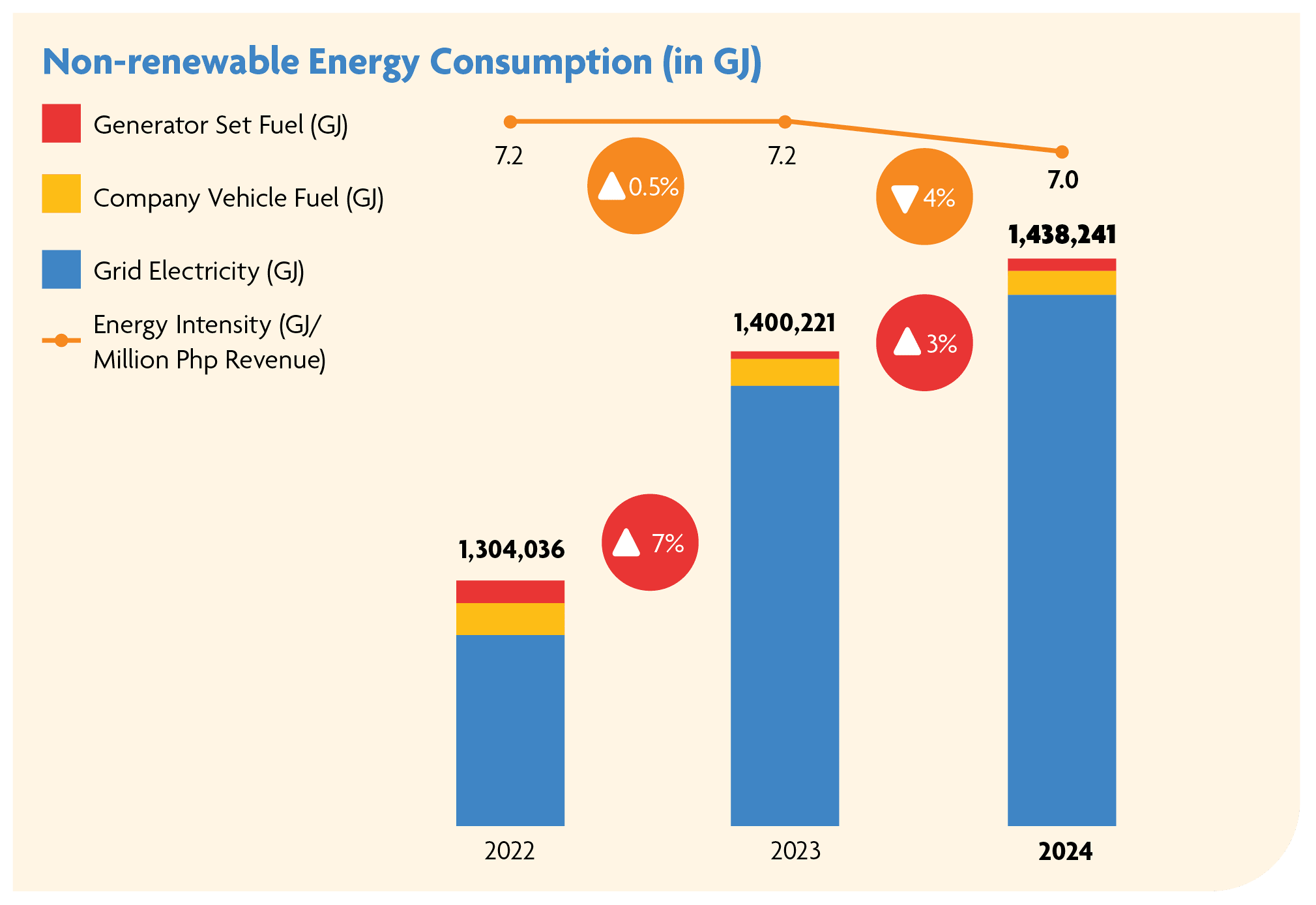
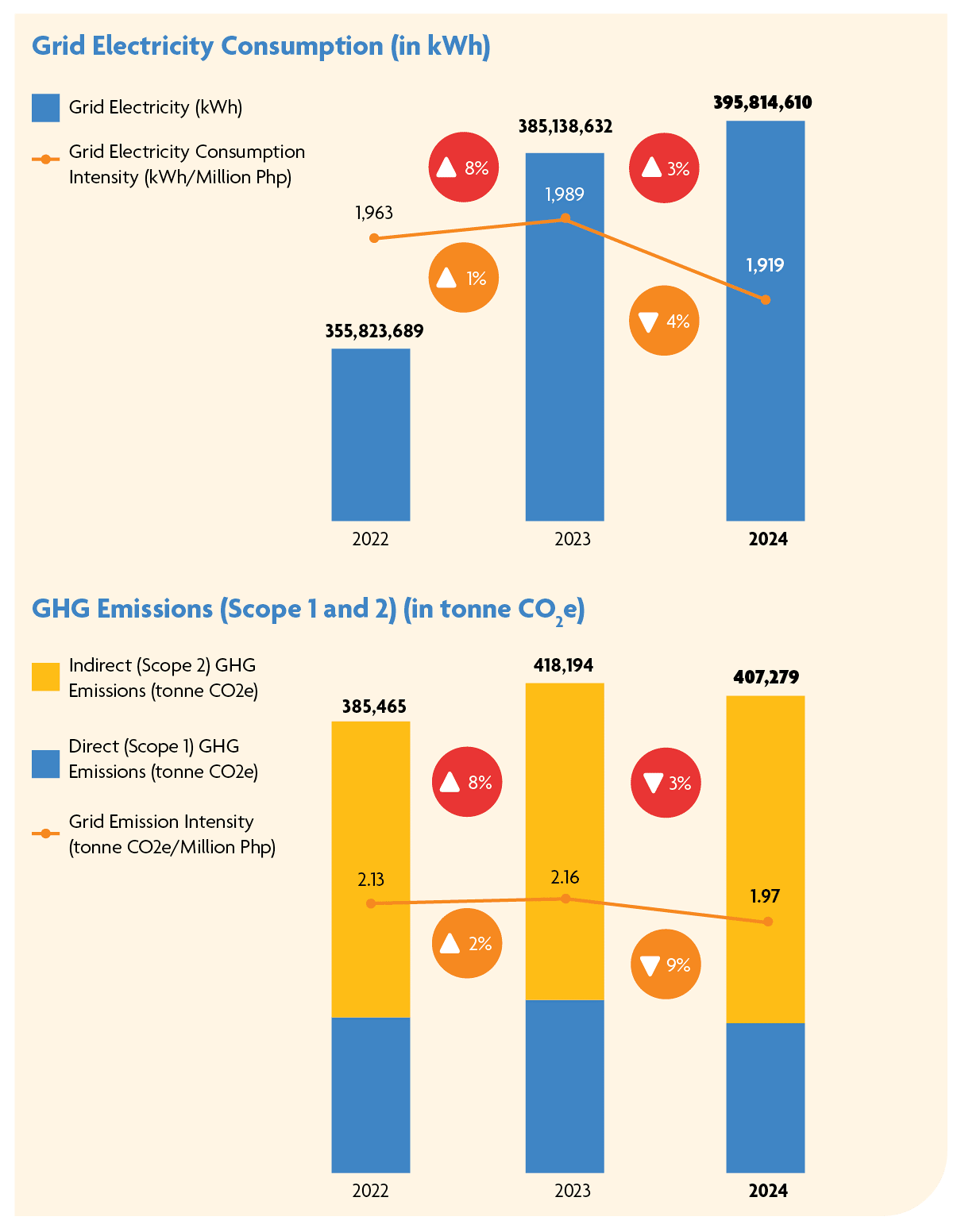

1. Based on renewable materials (paper bags) and
non-renewable materials (plastic bags) consumption
2. Based on solid waste generation data
3. Based on fuel consumption of rented vehicles
4. Based on plastic footprint of sold house brands
5. Based on electricity consumption of Uncle John's
franchised stores
 Powering Sustainability Forward
Powering Sustainability ForwardRecognizing the need for responsible energy resource
management, Robinsons Retail has taken a significant step
toward reducing its carbon footprint through the installation
of a solar energy system at its Head Office compound.
In April 2024, we completed the installation of a 382.8 kWp
solar panel system. From May to December of the same year, the
system generated an average of 29,293.82 kWh of electricity
per month, significantly reducing operational costs and
dependence on non-renewable energy sources.
Compared to our 2022 power consumption baseline, this
initiative has led to an average energy cost reduction of
21.22%. Additionally, it has yielded an impressive ₱335,832.39
in monthly savings, accumulating to ₱2,686,659.09 in total
annual savings.
Beyond cost efficiency, the environmental impact of this
initiative is evident. By generating renewable energy, we are
preventing the emission of approximately 166.9 metric tons of
carbon dioxide each month—equivalent to planting 7,600 mature
trees annually based on the Arbor Day Foundation's carbon
sequestration estimates.
To further our commitment to sustainability, we plan to
gradually expand solar panel installations beyond our Head
Office to include our stores, reinforcing our efforts to
reduce carbon emissions and optimize energy use. Furthermore,
we are preparing to implement our Energy Management Policy,
which will introduce measures to manage energy consumption,
lower emissions, and enhance environmental performance—all
while maintaining operational efficiency and meeting customer
needs.
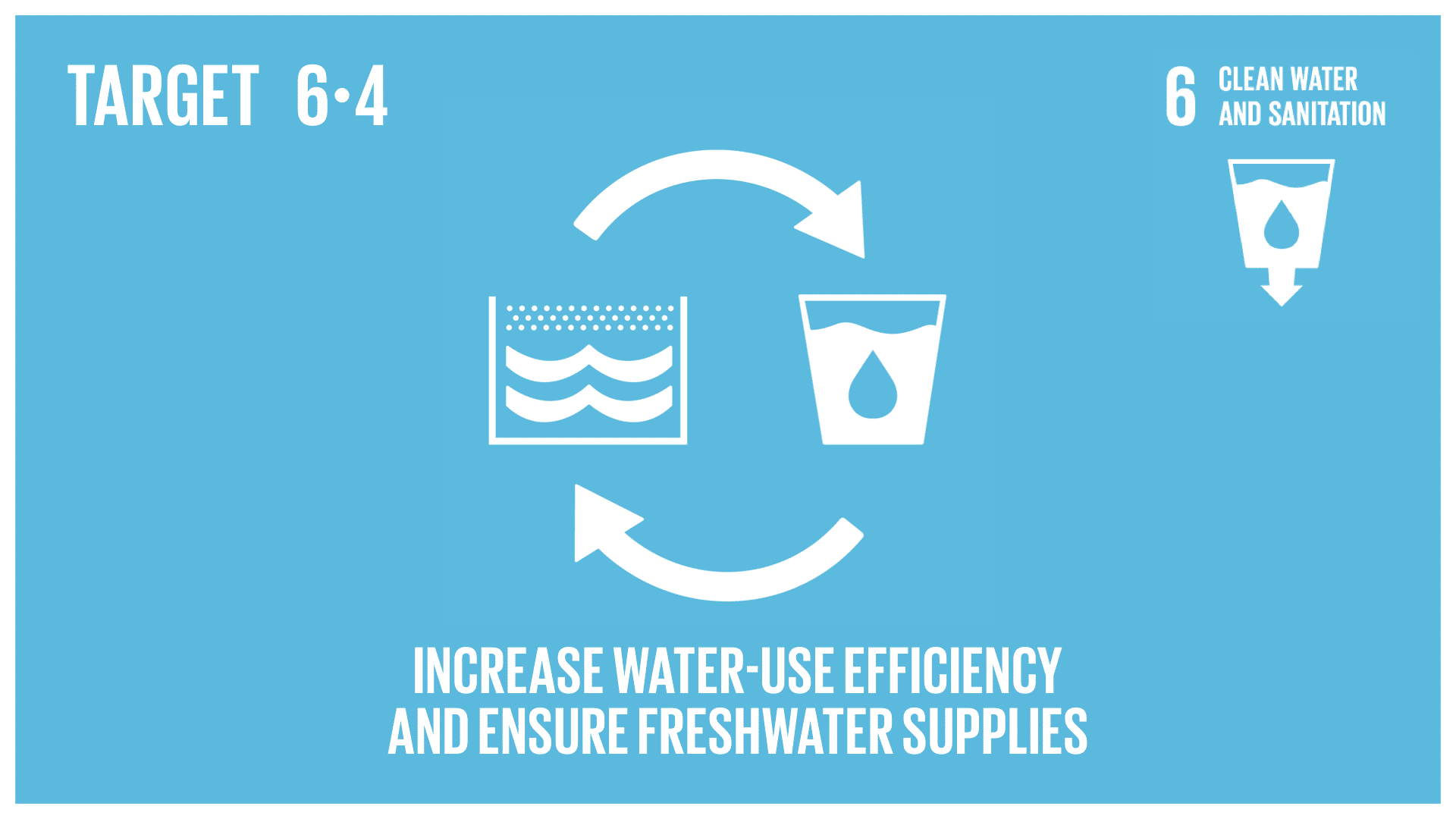
Water Management
Although Robinsons Retail’s operations are not considered
water-intensive, we continue to track water consumption across
our stores, offices, and warehouses. Water is sourced from
local third-party providers and is primarily used for lavatory
facilities, regular cleaning, and maintenance activities.
As our store and warehouse footprint grows, overall water
consumption has continued to increase. Our total water
consumption increased by 14% to 1,466,744 cubic meters in
2024. Our water use intensity also increase by 7% to 7.1 cubic
meters per million Pesos in revenue.
Routine monitoring of plumbing and water systems remains in
place across various locations, which may help in identifying
leakages or inefficiencies early. These efforts support the
continued exploration of practical ways to manage water use
more efficiently as our network expands.
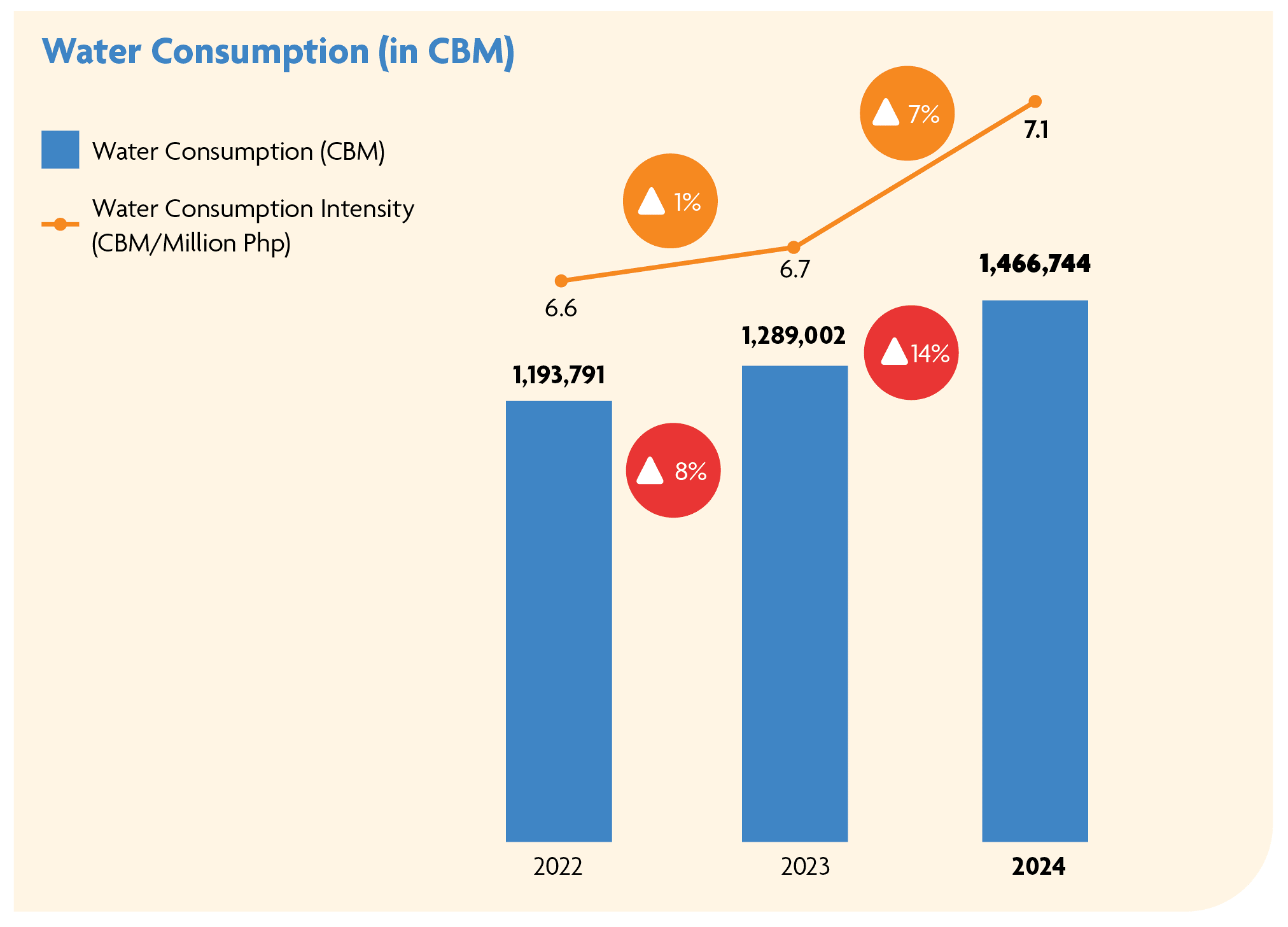

Waste Management
Robinsons Retail continues to monitor its waste generation
and management practices across stores and facilities.
Standardized segregation measures remain in place, with most
of the solid waste generated being non-hazardous—comprising
compostable, recyclable, and residual materials, which account
for 99.7% of total waste. Hazardous waste makes up a minimal
portion at 0.3%.
In 2024, total solid waste generation increased by 4%, or
424,732 kilograms, compared to the previous year. But, waste
generation intensity continued to decrease since 2023, this
time by 2%, from 52.4 to 51.2 kilograms of solid waste per
million Pesos in revenue.
Efforts to streamline waste data collection and analysis are
ongoing, contributing to a clearer picture of waste trends and
potential areas for improved handling and diversion.
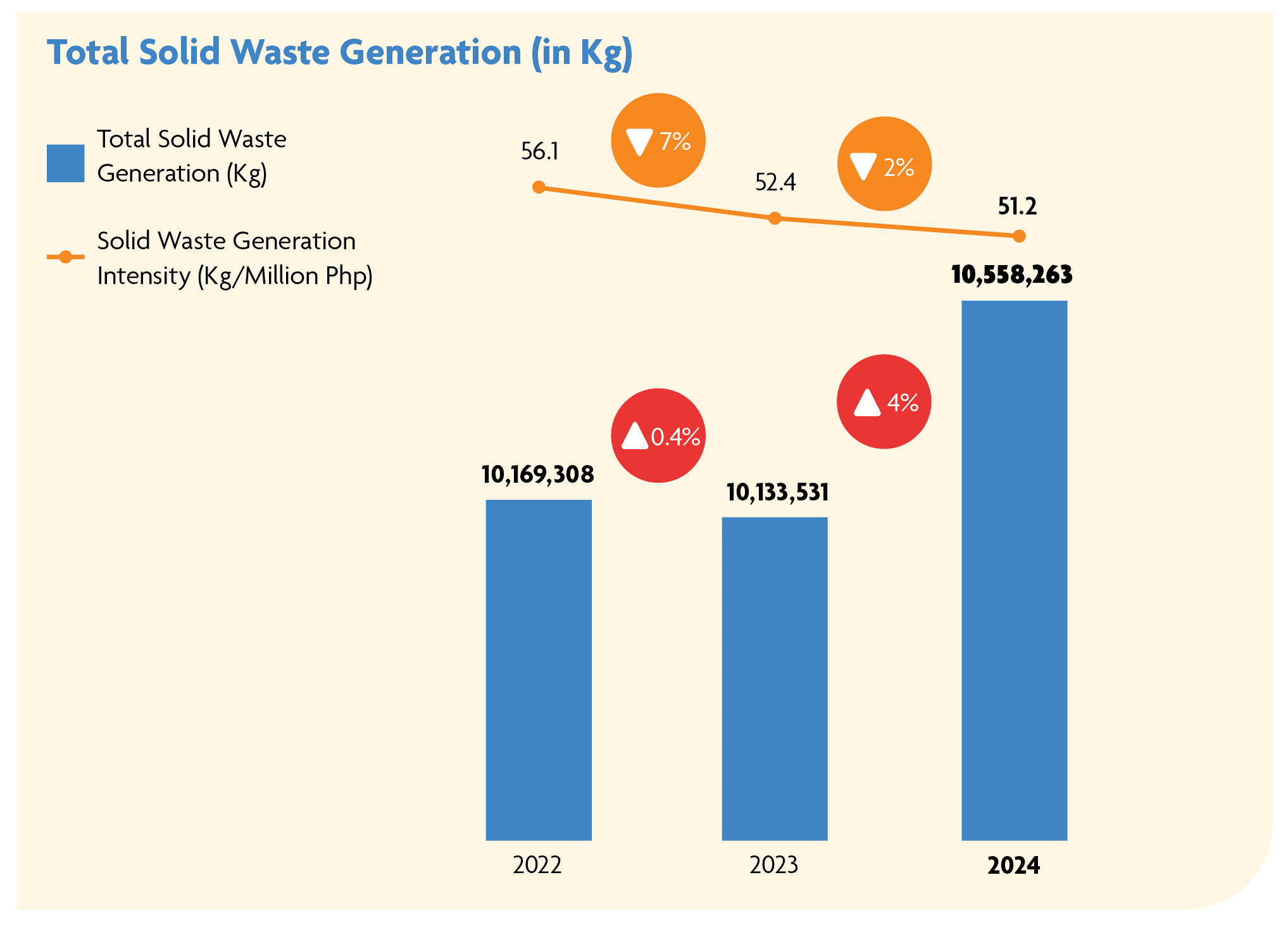
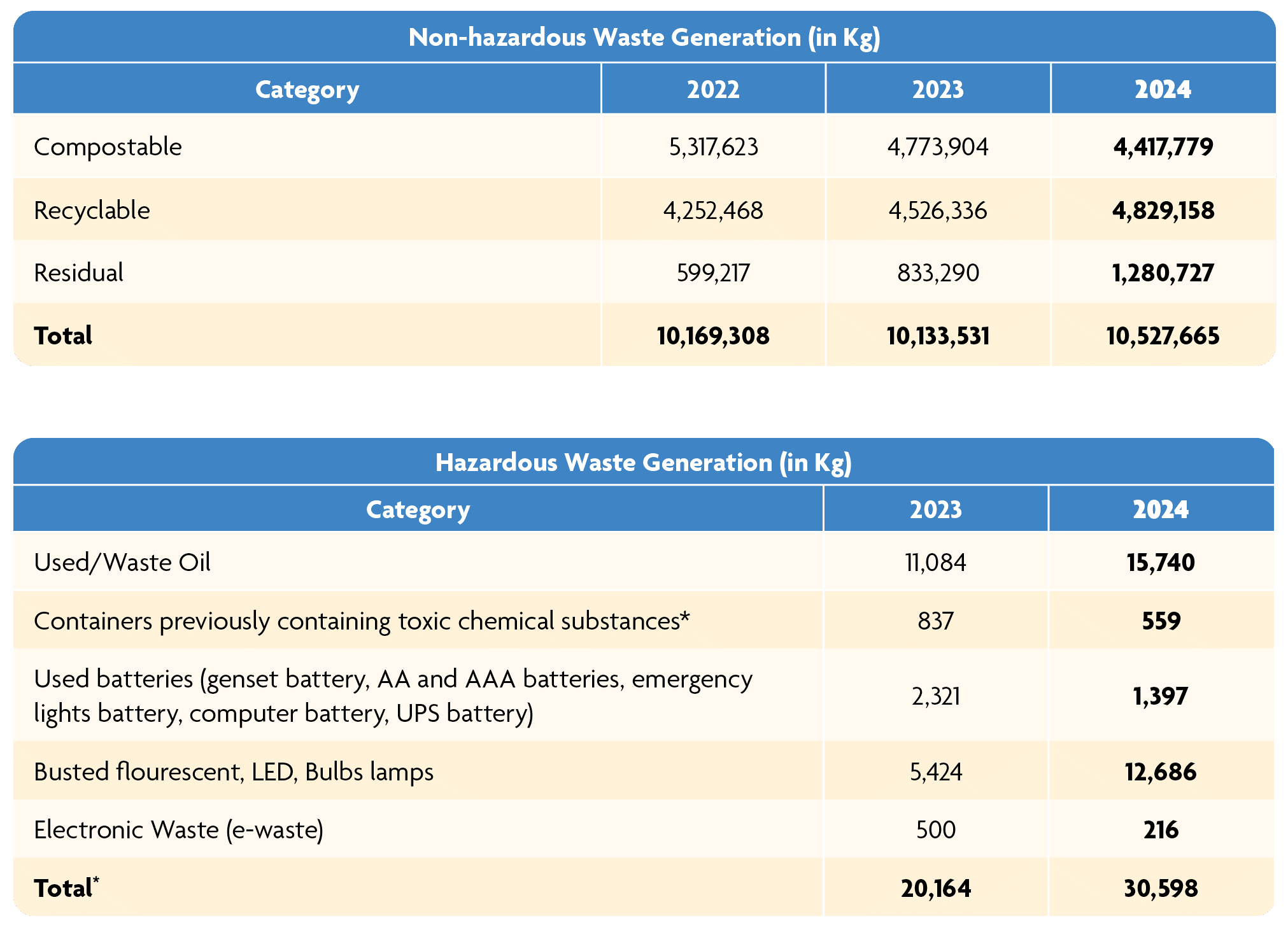
*Restated the 2023 value due to improvements in data consolidation and analysis.

Materials Consumption
Robinsons Retail continues to monitor the use of materials,
particularly in consumer packaging. While plastic bag
consumption remained relatively stable in 2024 despite store
expansions, the use of paper bags as an alternative increased
by 33.1%. This trend reflects the broader shift in packaging
preferences across various formats.
Efforts to improve data tracking on materials—such as
alternative packaging options and recycled or upcycled
inputs—are ongoing. These aim to build a more complete picture
of material use and support informed decision-making on
resource efficiency and sustainability.
Implementation of the Extended Producer Responsibility Act
also continues across our relevant business units, with
strategies evolving to gradually shift toward packaging with a
reduced environmental impact. Further updates on our plastic
footprint reduction will be shared as data and systems become
more standardized in the coming years.
